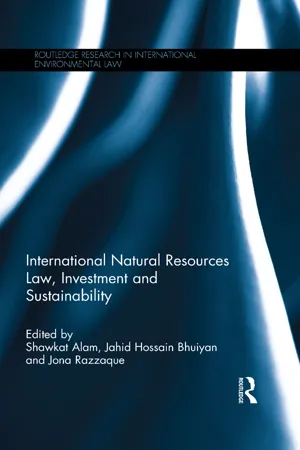
International Natural Resources Law, Investment and Sustainability
- 466 pages
- English
- ePUB (mobile friendly)
- Available on iOS & Android
International Natural Resources Law, Investment and Sustainability
About this book
International Natural Resources Law, Investment and Sustainability provides a clear and concise insight into the relationship between the institutions that govern foreign investment, sustainable development and the rules and regulations that administer natural resources. In this book, several leading experts explore different perspectives in how investment and natural resources come together to achieve sustainable development in developing countries with examples from water, oil and gas, renewable energy, mineral, agriculture, and carbon trading. Despite varying perspectives, it is clear that several themes are central in considering the linkages between natural resources, investment and sustainability. Specifically, transparency, good governance and citizen empowerment are vital conditions which encourage positive social, economic and environmental outcomes for developing countries. In addition, this book provides new insights into key concepts which underpin international law, including sovereign rights and state responsibility principles. It is clear from this book that in the attempt to reconcile these concepts and principles from separate legal regimes, complex policy questions emerge whereby it is difficult to attain mutually beneficial or succinct outcomes. This book explores how countries prioritise their policy objectives to achieve their notion of sustainable natural resource use, which is strongly influenced by power imbalances that inform North–South cooperation, as well as South–South cooperation in the international investment regime.
This book will be of great interest to students, academics and researchers of international environmental law, international human rights law, international investment law and international economic law. This book may also be of relevance to environmentalists, policy-makers, NGOs, and investors working in the natural resources field.
Frequently asked questions
- Essential is ideal for learners and professionals who enjoy exploring a wide range of subjects. Access the Essential Library with 800,000+ trusted titles and best-sellers across business, personal growth, and the humanities. Includes unlimited reading time and Standard Read Aloud voice.
- Complete: Perfect for advanced learners and researchers needing full, unrestricted access. Unlock 1.4M+ books across hundreds of subjects, including academic and specialized titles. The Complete Plan also includes advanced features like Premium Read Aloud and Research Assistant.
Please note we cannot support devices running on iOS 13 and Android 7 or earlier. Learn more about using the app.
Information
Part I
Natural resources law and investment law
Foreword
1 International natural resources law and sustainable investment
Introduction
Table of contents
- Cover
- Half Title
- Title Page
- Copyright Page
- Table of Contents
- Notes on contributors
- List of acronyms and abbreviations
- Acknowledgements
- Preface
- Introduction
- Part I Natural resources law and investment law: Interactions
- Part II Balancing competing interests
- Part III Changing dynamics
- Part IV Conflict, corruption and liability
- Index